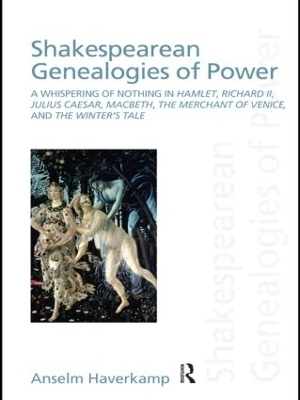
Shakespearean Genealogies of Power
A Whispering of Nothing in Hamlet, Richard II, Julius Caesar, Macbeth, The Merchant of Venice, and The Winter’s Tale
Seiten
2010
Routledge (Verlag)
978-0-415-59345-8 (ISBN)
Routledge (Verlag)
978-0-415-59345-8 (ISBN)
Shakespearean Genealogies of Power: A Whispering of Nothing addresses the new perspective on normativity opened up by Shakespeare’s stage, as a visible space between the spheres of politics and law.
Shakespearean Genealogies of Power proposes a new view on Shakespeare’s involvement with the legal sphere: as a visible space between the spheres of politics and law and well able to negotiate legal and political, even constitutional concerns, Shakespeare’s theatre opened up a new perspective on normativity. His plays reflect, even create, "history" in a new sense on the premises of the older conceptions of historical and legal exemplarity: examples, cases, and instances are to be reflected rather than treated as straightforwardly didactic or salvific. Thus, what comes to be recognized, reflected and acknowledged has a disowning, alienating effect, whose enduring aftermath rather than its theatrical immediacy counts and remains effective. In Shakespeare, the law gets hold of its normativity as the problematic efficacy of unsolved – or rarely ever completely solved – problems: on the stage of the theatre, the law has to cope with a mortgage of history rather than with its own success story. The exemplary interplay of critical cultural and legal theory in the twentieth-century – between Carl Schmitt and Hans Kelsen, Walter Benjamin and Ernst Kantorowicz, Hans Blumenberg and Giorgio Agamben, Robert Cover and Niklas Luhmann – found in Shakespeare’s plays its speculative instruments.
Shakespearean Genealogies of Power proposes a new view on Shakespeare’s involvement with the legal sphere: as a visible space between the spheres of politics and law and well able to negotiate legal and political, even constitutional concerns, Shakespeare’s theatre opened up a new perspective on normativity. His plays reflect, even create, "history" in a new sense on the premises of the older conceptions of historical and legal exemplarity: examples, cases, and instances are to be reflected rather than treated as straightforwardly didactic or salvific. Thus, what comes to be recognized, reflected and acknowledged has a disowning, alienating effect, whose enduring aftermath rather than its theatrical immediacy counts and remains effective. In Shakespeare, the law gets hold of its normativity as the problematic efficacy of unsolved – or rarely ever completely solved – problems: on the stage of the theatre, the law has to cope with a mortgage of history rather than with its own success story. The exemplary interplay of critical cultural and legal theory in the twentieth-century – between Carl Schmitt and Hans Kelsen, Walter Benjamin and Ernst Kantorowicz, Hans Blumenberg and Giorgio Agamben, Robert Cover and Niklas Luhmann – found in Shakespeare’s plays its speculative instruments.
Anselm Haverkamp is Professor of English at New York University. He is also a Professor of Literature and Philosophy in Berlin and Munich, and has held visiting appointments at Yale University, the EHESS in Paris, and the Cardozo Law School in New York.
1. Perpetuum Mobile: Shakespeare’s Perpetual Renaissance 2. The Ghost of History: Hamlet’s Politics of Paternity 3. Lethe’s Wharf: Wild Justice, the Purgatorial Supplement 4. Richard II, Bracton, and the End of Political Theology 5. The Death of a Shifter: Jupiterian History in Julius Caesar 6. The Future of Violence: Macbeth and Machiavelli 7. The Whispering of Nothing: The Winter’s Tale 8. But Mercy is Above: Shylock’s Pun of a Pound 9. Habeas Corpus: The Law’s Desire to Have the Body
| Erscheint lt. Verlag | 8.10.2010 |
|---|---|
| Reihe/Serie | Discourses of Law |
| Verlagsort | London |
| Sprache | englisch |
| Maße | 156 x 234 mm |
| Gewicht | 360 g |
| Themenwelt | Literatur ► Lyrik / Dramatik ► Dramatik / Theater |
| Geisteswissenschaften ► Philosophie | |
| Geisteswissenschaften ► Sprach- / Literaturwissenschaft ► Anglistik / Amerikanistik | |
| Geisteswissenschaften ► Sprach- / Literaturwissenschaft ► Literaturgeschichte | |
| Geisteswissenschaften ► Sprach- / Literaturwissenschaft ► Literaturwissenschaft | |
| Recht / Steuern ► Allgemeines / Lexika | |
| Recht / Steuern ► EU / Internationales Recht | |
| ISBN-10 | 0-415-59345-X / 041559345X |
| ISBN-13 | 978-0-415-59345-8 / 9780415593458 |
| Zustand | Neuware |
| Informationen gemäß Produktsicherheitsverordnung (GPSR) | |
| Haben Sie eine Frage zum Produkt? |
Mehr entdecken
aus dem Bereich
aus dem Bereich


